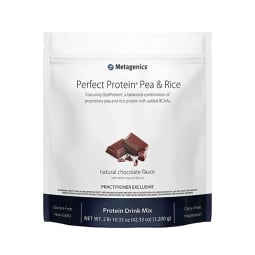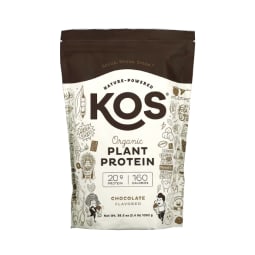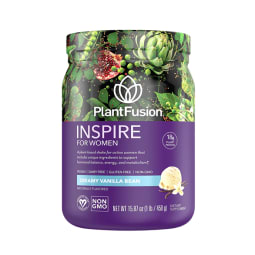Advertisement
8 Best Vegan Protein Powders Of 2025 + What To Look For


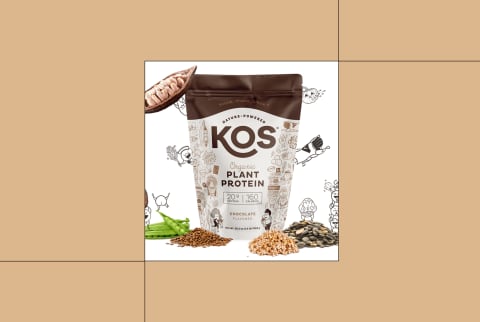
Our bodies are built on protein—but it can be difficult to get enough of it from plants alone.
Vegan protein powders make it easier to fulfill your protein needs without getting animals involved, but there's a catch: Many vegan protein powders on the market don't contain the essential amino acids that your body actually needs to rebuild and recover.
This guide will explore the ins and outs of what makes a well-formulated vegan protein powder and share the eight best vegan protein powders of the year.
- Best for muscle building: Metagenics Perfect Protein
- Best for weight management: Garden of Life Raw Organic Fit Protein Powder
- Best organic: KOS Organic Plant Protein
- Best tasting: Truvani Organic Vanilla Plant Based Protein Powder
- Best for women: Plant Fusion Inspire
- Best affordable: Life Extension Wellness Code Plant Protein
- Best with protease digestive enzyme: Ora Work It Performance Plant Protein Powder
- Best keto protein powder: Orgain Keto Plant Protein™ Organic Keto-genic Protein Powder
What is vegan protein powder?
Vegan protein powder is often made from peas, rice, hemp, or soy. More unique plants, like pumpkins, artichokes, and other legumes, seeds, or grains can be used to make different types of protein powder as well.
Consuming vegan protein powder is a healthy way to help ensure you're getting enough protein every day (more than 100 grams for most people) to fuel essential processes in the body.
Research shows that plant protein powders can build muscle and promote metabolic health1 just as well as animal-based powders can (when consumed in larger amounts2).*
The key is that they need to be well-formulated (with complementary plant protein combinations) to contain all nine essential amino acids—especially leucine, one of three essential BCAAs.
Leucine triggers mTOR3, a key cellular signaling pathway that initiates muscle growth and speeds up recovery, and experts believe we should aim for at least 2.5 grams4 of the amino acid in each meal to support this important physiological process (and supplements can be an important part of obtaining this goal).
For context, whey protein powder (from cows or goats) typically has about 8 to 10% leucine content. Soy is 7.8%, while hemp is 5.1%5. This means, as leading protein and amino acid researcher Don Layman, Ph.D. explains on the mindbodygreen podcast, that it would take 23 grams of whey protein to trigger muscle growth and 33 or 34 grams of soy.
It can be trickier to find out how much leucine is in combination plant protein powders, as amino acid compositions are not always listed on labels. When possible, you'll want to go with a protein powder that is transparent about its amino acid content. (We call out a few below.)
Summary
How we picked the best vegan protein powders
- Vegan protein: Each powder delivers a meaningful dose of protein sourced exclusively from plants. These vegan supplements can be enjoyed by everyone (not just vegetarians and vegans) thanks to their healthful formulas and convenience in infusing diverse protein sources in our day. We prioritized proteins that have higher BCAA counts and are transparent about amino acid
- Diverse ingredients: These product offerings feature innovative formulas with a variety of plant-sourced proteins, from pea and rice, to seeds, grains, and more. Additionally, you’ll find complementary additions like digestive enzymes, greens blends, probiotics, fiber, and even keto-friendly fats.
- Quality: We include reputable brands that prioritize quality testing, to ensure the potency of ingredients, but also the purity (limiting heavy metals, microbials, etc.). These products strive to be clean, with high-quality additional ingredients to complement the taste experience.
- Sustainability: Whether in ingredient sourcing or product and packaging materials, we appreciate protein powders created with sustainability in mind. We take pride in highlighting green initiatives and certifications, as well as recyclable and eco-friendly packaging options.
Our picks for the best vegan protein powders
Pros
- Supports an active lifestyle*
- Extra branched-chain amino acids
Cons
- Flavors added
Protein per serving:
20 gramsFlavors:
ChocolateVanillaSugar content:
3 gramsLeucine content:
2.77 gramsDietary considerations:
GMO-freeGluten-freeDairy-freeVegan/ vegetarianCertified Organic:
NoServing size:
2 scoopsFlavors: Chocolate, Vanilla
Metagenics' powder is made of pea protein—a highly bioavailable and easy-to-digest plant protein source. One 2015 study in the Journal of the International Society of Sports Nutrition found that men who took pea protein over a 12-week resistance training program experienced similar improvements in muscle size and strength as those who took whey protein.
On top of 20 grams of pea protein per serving (2 scoops), this powder contains an extra 3.5 grams of essential amino acids, which are important for muscle growth.
It hits the necessary leucine threshold to gain muscle thanks to added BCAAs, with an average of 2.77 grams per serving. It's a bit higher in sugar than some other options on this list, though, and its sweetness comes from cane sugar, monk fruit extract, and stevia extract.*
What it tastes like: Reviewers note that this sweet protein has a smooth flavor with none of the funky aftertastes you'll find in other plant proteins. It can be added to smoothies or shakes, or simply blended with cold water.
Best for weight management: Garden of Life Raw Organic Fit Protein Powder
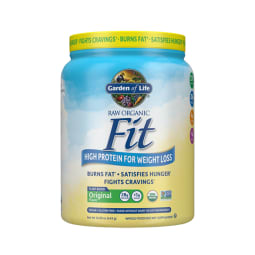
Pros
- Promotes fat burn & satiety*
- Features green coffee bean extract
- Contains added digestive enzymes
- Certified B Corporation
Cons
- Contains sesame allergen
- Flavors added
Protein per serving:
28 gramsFlavors:
ChocolateVanillaOriginalSugar content:
Less than 1 gramLeucine content:
2.34 gramsDietary considerations:
GMO-freeGluten-freeDairy-freeVegan/ vegetarianSoy-freeCertified Organic:
YesServing size:
1 scoopFlavors: Chocolate, Vanilla, Original
This plant-based blend is made from 13 raw, sprouted organic grains, seeds, and legumes including peas, brown rice, chia seed, and flax seed. There is no soy in this product. On top of 28 grams of protein per serving (including 5 grams of BCAA and a respectable 2.34 grams of leucine), it's fortified with live probiotics and enzymes to assist with digestion and decaffeinated green coffee bean extract to promote fat burn and curb cravings. It also contains a superfood blend of ashwagandha root, baobab, and cinnamon to further support healthy weight management.
Reviewers note that Garden of Life's formula is filling and effectively stops food cravings—and it's very low in sugar to boot. We appreciate that its raw ingredients are certified organic and that Garden of Life is a certified B Corporation for its commitment to sustainability.*
What it tastes like: The vanilla, chocolate, and original flavors are subtle and not too sweet, though they do have an "artificial" aftertaste and gritty texture, some reviewers note. However, it's nothing a well-formulated smoothie can't fix.
Advertisement
Pros
- Good source of fiber
- Features digestive enzyme blend
Cons
- Contains tree nut allergen (coconut)
- Flavors added
- No amino acid profile provided
Protein per serving:
20 gramsFlavors:
ChocolateVanillaSugar content:
2 gramsLeucine content:
Not listedDietary considerations:
GMO-freeGluten-freeDairy-freeVegan/ vegetarianSoy-freeCertified Organic:
YesServing size:
2 scoopsFlavors: Chocolate, Vanilla
This popular powder contains a mixture of pea, flax, quinoa, pumpkin seed, and more, making it a complete protein source. (The brand does not share its amino acid breakdown, however, so it's hard to know if the amino acid profile is balanced.) It also contains 3 grams of dietary fiber for a healthy gut and immune response and digestive enzymes and prebiotics for further gut support.*
Kos prides itself on using organic ingredients, and its lower-impact packaging is made from recycled materials.
What it tastes like: Kos powder contains coconut, monk fruit, and stevia for a rich and tasty flavor that reviewers pretty unanimously love. They note that the powder—particularly the chocolate variety—tastes great no matter what you blend it in and is especially delicious mixed with plant milk.
Best tasting: Truvani Organic Vanilla Plant Based Protein Powder
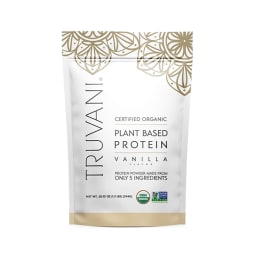
Pros
- Comes in many flavor varieties
- Clean formula
Cons
- No amino acid profile provided
Protein per serving:
20 gramsFlavors:
ChocolateVanillaOriginalPeanut butterVanilla chaiBanana cinnamonChocolate peanut butterSugar content:
1-2 grams depending on flavorLeucine content:
Not listedDietary considerations:
GMO-freeGluten-freeDairy-freeVegan/ vegetarianSoy-freeCertified Organic:
YesServing size:
1 scoopFlavors: Original, Chocolate, Vanilla, Peanut butter, Vanilla chai, Banana cinnamon, Chocolate peanut butter
Truvani's simple ingredient list is what sets this plant protein powder apart. Each bag contains pea protein, chia seeds, pumpkin seeds, and monk fruit, plus some extra natural spices depending on the flavor—no fillers or funky additives. This powder also contains 3 grams of fiber per serving and is very low in sugar, especially when you consider how pleasantly sweet it tastes. Truvani says that one of its flavor secrets is to remove pea's pods before turning them into protein powder, which leads to a smoother and richer taste.
What it tastes like: If you have a sweet tooth, this is the plant protein powder for you. As one reviewer puts it, "It's like cake in a cup without the dairy." It's not chalky or grainy and comes in a variety of crave-able flavors including chocolate peanut butter, vanilla chai, and banana cinnamon.
Advertisement
Pros
- Hormonal balance and energy support*
- Features botanicals and digestive enzymes
Cons
- Plastic container
- Flavors added
- MCT oil source not clear, but likely coconut (tree nut allergen)
Protein per serving:
18 gramsFlavors:
ChocolateVanillaSugar content:
Less than 1 gramLeucine content:
Not listedDietary considerations:
GMO-freeGluten-freeDairy-freeVegan/ vegetarianSoy-freeKosherCertified Organic:
NoServing size:
1 scoopFlavors: Chocolate, Vanilla
PlantFusion’s Inspire formula contains a mix of pea protein and more unique sources like artichoke protein and algae protein. It contains 4 grams of BCAAs per serving, though it's not clear what the amino acid breakdown is.
Designed specifically for women, the formula also has pomegranate extract to support hormonal balance, ashwagandha to ease stress, L-theanine to rev up focus, and biotin to promote healthy skin and nails as well as help balance blood sugar. Plus, it has added digestive enzymes for gut health and MCTs to enhance cognition and support metabolic health.*
What it tastes like: Though the powder does not contain sugar, it's sweetened with a blend of monk fruit, lucuma fruit, yacon root, and stevia. Reviewers note that this does give it a slight aftertaste, though the flavor is still pleasantly mild and the texture blends very easily into shakes and smoothies.
Best affordable: Life Extension Wellness Code Plant Protein
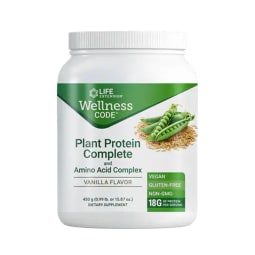
Pros
- Protein plus amino acid blend
- Supports lean muscle mass*
Cons
- Plastic container
- Flavors added
- Has an artificial taste
Protein per serving:
18 gramsFlavors:
VanillaSugar content:
Less than 1 gramLeucine content:
Not listedDietary considerations:
GMO-freeGluten-freeDairy-freeVegan/ vegetarianSoy-freeCertified Organic:
NoServing size:
1 scoopFlavors: Vanilla
This pea protein powder is fortified with additional BCAAs (though the company does not share amino acid breakdowns on its website). It also contains inulin from blue agave, and digestive enzymes from pineapple for gut support.*
It's an affordable option that is well-suited for those who are new to the world of protein powders, though we don't love the plastic packaging or long list of added ingredients (including unspecified natural flavors, seed oils, and xanthan gum).
What it tastes like: Reviewers note that this powder has a strong artificial vanilla flavor that can be overpowering, so you need to doctor it up with smoothie mix-ins.
Advertisement
Best with protease digestive enzyme : Ora Work It Performance Plant Protein Powder
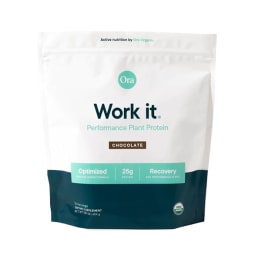
Pros
- Supports performance and recovery*
- Features protein digestive enzyme
Cons
- 5 grams of added sugars
- Flavors added
- Contains tree nut allergen (coconut)
Protein per serving:
25 gramsFlavors:
ChocolateVanillaOriginalSugar content:
5 gramsLeucine content:
Not listedDietary considerations:
Gluten-freeDairy-freeVegan/ vegetarianSoy-freeCertified Organic:
YesServing size:
2 scoopsFlavors: Chocolate, Vanilla, Original
This performance plant protein is geared towards active people who are looking to optimize recovery. It packs an impressive 25 grams of protein (from various plant sources including peas, rice, chia seeds, and more unique sources like watermelon) and contains plant-based protease enzymes.
These enzymes help assist with digestion to ensure that your body is optimally absorbing and utilizing the protein. Research shows that they can help the body take in more amino acids following a workout, and help maximize digestive comfort along the way. Ora's formula is complete, but its amino acid breakdown is unclear. Unlike other protein powders that can be taken at any time of day, Ora recommends consuming this one within 30 minutes of a workout to reap the most recovery and muscle-building benefits.*
What it tastes like: Ora's formula has a simple ingredient list, but it has more sugar (from organic coconut sugar and organic stevia extract) than any other option on our list. This leads to a pleasantly sweet taste that goes down extra easy thanks to the digestive enzymes.
Best keto protein powder: Orgain Keto Plant Protein™ Organic Keto-genic Protein Powder
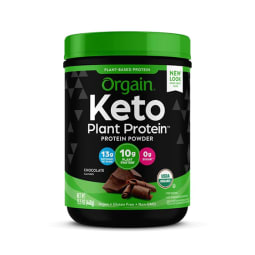
Pros
- Keto-friendly protein to fat ratio
Cons
- Contains sugar alcohols and added flavors
- Plastic container
Protein per serving:
10 gramsFlavors:
ChocolateVanillaSugar content:
Less than 1 gramDietary considerations:
GMO-freeGluten-freeDairy-freeVegan/ vegetarianSoy-freeKosherKeto friendlyCertified Organic:
YesServing size:
2 scoopsFlavors: Chocolate, Vanilla
This powder has a keto-friendly ratio of protein to fat, making it a good pick for vegans who are keto or following a low-carb diet. It contains 10 grams of plant-based protein (from peas) and 13 grams of organic, plant-based fats (from coconut oil, avocado oil and cocoa butter). It can be consumed on its own or combined with MCT oil for a satiating serving of protein and healthy fats to hold you over until your next meal.
With its lower protein count, however, this isn't the best pick for building muscle. Its amino acid count is not listed either.
What it tastes like: The taste of this powder is hit or miss among reviewers; some note that it's easy to blend into smoothies and hot beverages like coffee while others find it too lumpy and artificial for their liking.
Advertisement
Comparing the best vegan protein powders
| Product | Price | Protein per serving | Serving size | Leucine content | Certified Organic |
|---|---|---|---|---|---|
| Metagenics Perfect Protein | $67 | 20 grams | 2 scoops | 2.77 grams | No |
| Garden of Life Raw Organic Fit Protein Powder | $42 | 28 grams | 1 scoop | 2.34 grams | Yes |
| KOS Organic Plant Protein | $43 | 20 grams | 2 scoops | Not listed | Yes |
| Truvani Organic Vanilla Plant Based Protein Powder | $50 | 20 grams | 1 scoop | Not listed | Yes |
| Plant Fusion Inspire | $43 | 18 grams | 1 scoop | Not listed | No |
| Life Extension Wellness Code Plant Protein | $27 | 18 grams | 1 scoop | Not listed | No |
| Ora Work It Performance Plant Protein Powder | $40 | 25 grams | 2 scoops | Not listed | Yes |
| Orgain Keto Plant Protein™ Organic Keto-genic Protein Powder | $39 | 10 grams | 2 scoops | Not listed | Yes |
How to choose
To choose the right vegan protein powder for your needs, you'll want to consider the following:
- GI friendly: Clean vegan protein powders that don't contain as many artificial sweeteners, added flavors, and other additives will be less likely to cause stomach upset. If you have gut sensitivities or concerns that make it difficult to fully extract nutrients from food, you might want to opt for a protein powder with added digestive enzymes, like Plant Fusion or Ora Organic.
- Amino acid content: As noted earlier, the best complete vegan protein powders will be formulated with complementary plant protein sources (think: pea and rice) to contain all nine essential amino acids along with a meaningful dose of BCAA content (especially leucine) per serving. Everyone, but especially those looking to build muscle, will want to prioritize protein powders that fit these qualifications.
- Flavor profile: Vegan protein powders come in plenty of flavors these days. Feel free to experiment to find one that fits your tastebuds; just beware that the super artificial-sounding ones likely contain lots of added sweeteners that may not be so great for your gut health.
- Packaging: If you're eating vegan for environmental reasons, you're probably also looking for a product that's produced and packaged responsibly. Ditch large plastic tubs for recyclable paper bags and buy from brands that source their ingredients responsibly like Garden of Life, a certified B Corporation.
Summary
Is vegan protein powder for me?
There are a few reasons to choose a vegan protein powder over an animal-based one, despite its less complete amino acid profile.
The most obvious is if you follow a strictly plant-based diet. But some meat eaters might also want to weave more plants into their nutrition regimen and be easier on their personal carbon footprint6 too.
Plant protein powders can also contain key nutrients from plant sources that you won't find in animal-based ones (e.g., dietary fiber, and omega-3 fatty acid ALA, to name a couple).
Plant proteins are convenient to boot; add 1-2 scoops to a breakfast bowl, smoothie, or shake and you're well on your way to meeting your daily protein needs.
Of course, powders do not replace whole-food protein sources; they work together. And even the most complete protein powders can't build muscle alone.
You need to pair them with resistance exercises to see any change in body composition and strength.
Side effects and safety
Vegan protein powders are safe to consume for most people. However, those with nut or seed allergies or sensitivities to legumes (e.g., pea, soy, etc.) will want to be careful about what kind they buy.
Some vegan protein powders might cause digestive discomfort. There's also the not particularly dangerous (but unpleasant) side effect of a bad aftertaste.
Eating too much protein7 at one time can cause abdominal discomfort, tiredness, and irritability in some people.
Those with existing kidney issues or considerations will want to be extra cautious about protein intake levels and would be partnering with their healthcare provider to achieve nutritional goals.
How much protein do you need a day?
Protein is an essential macronutrient, meaning we must consume it daily for our bodies to run optimally.
While daily protein requirements vary depending on factors like age, weight, physical activity level, and health status, emerging research is finding that active people should consume 100 to 120 grams of protein per day8.
This means you'll want to aim to eat at least 25 to 30 grams of high-quality protein8 in each meal. This is especially important as you get older and begin to lose muscle mass9.
Every time you eat protein, you're investing in whole-body health, immune function, and especially muscle growth and maintenance. And since muscles are a prime site for glucose and fat metabolism, protein is also helpful for insulin sensitivity, metabolic health, and cellular energy.
Plus, high-quality protein is very satiating10 and can be used to promote healthy weight management11 and healthy body composition12. (Learn more about how to use protein for healthy weight goals here.)*
Plant vs. animal protein
The protein (i.e., the amino acid profile, or array) you'll find in a plant is not the same as the protein you'll find in an animal (think: poultry, beef, fish, eggs, dairy, etc).
For starters, individual plant proteins (with the exception of soy) naturally do not contain adequate amounts of all nine essential amino acids, many of which (especially the branched-chain amino acids, BCAAs) are critical for muscle growth and repair.
This means that plant proteins are technically, by definition, "incomplete" and must be combined with other protein sources to build something that starts to resemble animal protein, which is complete.
One serving of plants is also typically lower in overall protein than a serving of meat. A serving of chicken (3.5 oz) has 32 grams of protein13, for example, while a serving of black beans has 24 grams14. Protein from plants is also less bioavailable than animal protein (e.g., whey).
This isn't to say that we should all swap beans for meat. Plant-based diets have health (not to mention environmental) benefits of their own.
It's possible to be vegan and still get enough protein. It just takes more effort—and potentially more protein powder, too.
FAQ
Is vegan protein powder inflammatory?
It shouldn't be. Vegan proteins like soy have actually been shown to improve antioxidant status and support a healthy inflammatory response in clinical research.
However, some protein powders can contain pro-inflammatory additives like sugar so you'll want to look for a clean formula with minimal extra ingredients.
What are the negatives of protein powder?
Protein powders deliver a concentrated amount of protein, but they don't have the same nutritional array as whole foods. Depending on the formulation, protein powders can also be less filling than whole-food protein sources.
Is vegan protein powder as good as whey?
It depends what you're looking for. Whey is a complete protein, making it more effective at stimulating muscle growth and recovery. However, research has found that they both have positive impacts on providing our body with diverse amino acids, while supporting healthy body composition and muscle density.*
Conventional whey protein comes with sustainability considerations and won't be suitable for vegans or those with certain sensitivities. In those cases, vegan protein powder is a good alternative.
The takeaway
Vegan protein powders can make it easier for plant-based eaters and those with sensitivities to meet their daily protein needs (which may be higher than you think).
Just be sure to choose one that is transparent, quality tested, and low (or absent) in artificial sweeteners and preservatives.
And don't go on a completely liquid diet just yet: your body needs whole food sources of protein, too!
Meet The Experts
14 Sources
- https://pubmed.ncbi.nlm.nih.gov/30621129/
- https://www.ncbi.nlm.nih.gov/pmc/articles/PMC8230006/
- https://www.ncbi.nlm.nih.gov/pmc/articles/PMC5096790/
- https://www.ncbi.nlm.nih.gov/pmc/articles/PMC7360447/#bib34
- https://www.ncbi.nlm.nih.gov/pmc/articles/PMC6245118/
- https://www.ncbi.nlm.nih.gov/pmc/articles/PMC7760812/
- https://pubmed.ncbi.nlm.nih.gov/26797090/
- https://www.ncbi.nlm.nih.gov/pmc/articles/PMC5872778/
- https://www.ncbi.nlm.nih.gov/pmc/articles/PMC4924200/
- https://pubmed.ncbi.nlm.nih.gov/18187437/
- https://www.ncbi.nlm.nih.gov/pmc/articles/PMC2289832/
- https://pubmed.ncbi.nlm.nih.gov/24724774/
- https://fdc.nal.usda.gov/fdc-app.html#/food-details/331960/nutrients
- https://fdc.nal.usda.gov/fdc-app.html#/food-details/747444/nutrients
